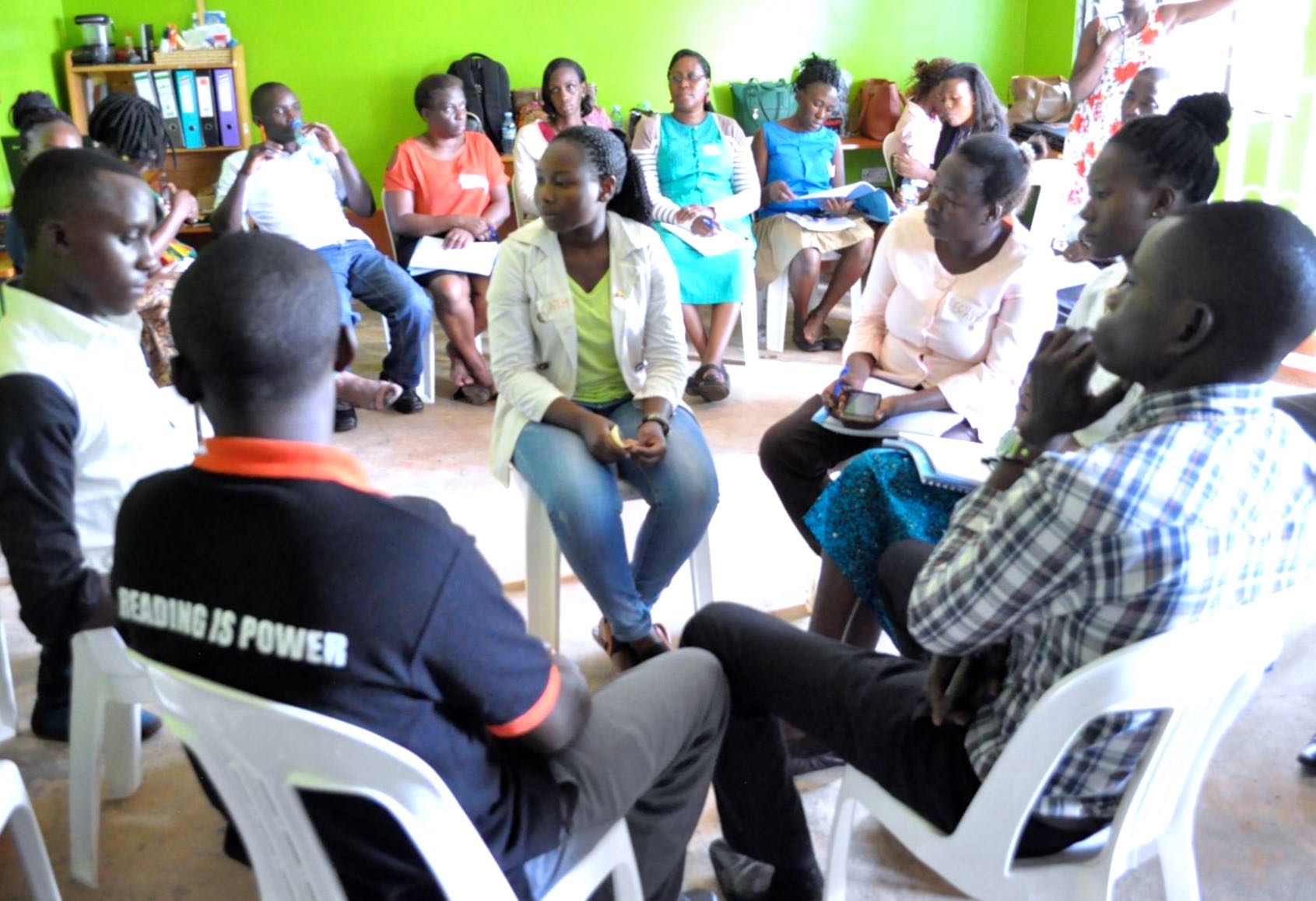
In 2018, EIFL and partners Peer to Peer University and Kenya National Library Service completed a three-year project to test and encourage growth of learning circles - in-person study groups for online learners - in public libraries in Africa. The results far exceeded the project’s goals - in just one year (2018) over a thousand people completed online courses in a wide range of subjects in libraries in Kenya and Uganda, and in Zambia dozens of learners are working through courses. Jean Fairbairn, EIFL Communications Manager, interviewed public librarians and successful learners to find out more.
Research indicates that 80% of the people who enroll for online learning fail to complete their courses. One of the main reasons for failure is loneliness. Learning circles - in-person study groups - add a social element to learning via the internet by bringing learners together to work through their courses. Guided by a facilitator, groups of learners share knowledge and skills, and motivate each other to keep going.
“People help each other to understand the topic and the technical issues of online learning during meetings. They learn from each other through discussion. They enjoy the experience,” explained librarian Kaltuma Sama, who is an enthusiastic learning circles facilitator at Buruburu Public Library in Kenya.
The learning circles methodology was developed and tested in 2015 by the non-governmental agency, Peer to Peer University (P2PU) in the USA, where it proved to be successful in boosting online course retention rates. In 2016, EIFL and P2PU wanted to test the methodology in Africa. We chose Kenya for a one-year (2016/17) pilot project, because all 62 public libraries in the Kenya National Library Service (KNLS) network had been equipped with computers and connected to the internet.
The results of the pilot were excellent: 246 people signed up for learning circles in two KNLS libraries - about three times as many we planned for - and over 90% of the learners completed their courses. The idea blossomed: two more libraries began offering learning circles during the pilot period, and by mid-2017, 11 more KNLS libraries had committed to offering learning circles.
Rolling out the programme in Africa
In 2018 EIFL, P2PU and KNLS worked together to expand the project in Kenya and to roll it out to other countries in Africa. During the year, 15 KNLS libraries completed 64 learning circles, with 1,076 learners (again, exceeding the project goal), all of whom completed their courses. After undergoing training conducted by experience KNLS facilitators and P2PU, eight Ugandan public and community libraries completed learning circles with 72 learners, and four Zambian libraries had started learning circles or laid the ground for launching them in 2019.
Hardy Omoche, a 24-year-old fruit, vegetable and small livestock farmer, was one of Kaltuma’s star learners in Buruburu Public Library in 2018. The learning circle he joined was taking an online course in ‘Entrepreneurship: Thinking and Action’.
“My farm was struggling, because I did not understand the importance of capital investment and how to obtain it. This has been the main thing I learnt - how to find and win over small investors. Now I am planning to upgrade my farm to include cattle,” he said.
Hardy thoroughly enjoyed the learning experience: “The group was really helpful. It was they who gave me ideas for finding investors,” he said.
Learning circles develop a life of their own
Isa Maganda, Chief Librarian at Nambi Sseppuuya Community Resource Centre in Igombe village was one of 25 Ugandan librarians who attended facilitators’ training in Kampala. When he first raised the idea of online learning with the community, he found that people were extremely keen. However, an assessment found that potential learners first needed to learn basic computer skills. So this became the topic of the centre’s first learning circle.
The group of 11 people met on Saturdays and Sundays, and some weekday evenings, for three-hour learning and practising sessions in the centre’s computer lab. “The centre is blessed to have 30 computers, all connected to the internet, which we received from the Uganda Communications Commission. So we were well set up for a learning circle,” said Isa.
All group members completed their courses, which included keyboard and software skills (Word, Excel, PowerPoint) and how to use the internet for research and communications. Some learners went on to explore and learn desktop publishing and design skills. “Five of our participants have found jobs, or moved on to new and better paying jobs. Others are now applying their skills in their work, for example, to write reports and give presentations; others are using design skills to make and sell cards like invitations to weddings, using templates they are finding online,” said Isa.
Learning circles have developed a life of their own in the community.
“Now, with their computer and internet skills, our learners can research online for courses they want to study by themselves – and I am just there to guide them, to help them form groups, and to learn and share. Learners are now bringing friends and family members to join courses,” said Isa.
One of the centre’s keenest learners is Zariakah Kyozira, aged 25, who has started her own learning circle with a group of three friends who are taking an online course in baking. “More will join us,” said Zariakah. “Using the tips from the course and the recipes from the internet, we are taking orders and baking delicious cakes and cookies, which we are selling from home,” she said. “Already we are making money, and we plan soon to start supplying local shops.”
Helping unemployed youth prepare for the world of work
In Zambia, three public libraries launched learning circles in December 2018. One of them was Lubuto Library Partners Model Library in Lusaka, where librarians Given Besa, Tukiya Mbewe and Brenda Mkandawire are facilitating a learning circle in which 15 to 20 vulnerable youth are learning computer skills to prepare them for the world of work. “This opportunity to learn in a group is very special for vulnerable youth, especially those who are out of school and who are isolated in many ways, often without families. They struggle to get formal training,” said Besa.
The programme has raised participants’ awareness about the huge volume of free courses available online. “Now they are becoming more interested in learning new things and sharing with others,” said Tukiya.
Advantages of public libraries for online learning
Since the first P2PU pilot in the USA in 2015, there have been 534 learning circles covering 371 topics in various geographies. Each group selects a topic of interest to them. In the public libraries where we have worked, in Kenya, Uganda and Zambia, the most popular courses chosen involved learning practical skills: web design, cooking healthy meals, basic computer skills, essentials of entrepreneurship, marketing, interview skills, storytelling and leadership.
For public libraries that want to introduce learning circles programmes, the P2PU web-portal provides a facilitator's’ guide and other resources. Kaltuma, who has conducted 10 learning circles since 2016, says she still finds these resources extremely useful. “They remind me about the principles of facilitating groups and group discussion, how to give everyone a chance to speak and how to resolve conflict if it arises,” she says.
Learning circles are just one of many ways in which public libraries can facilitate online learning in their communities. Supporting knowledge and learning is a core mission of public libraries, and the huge number of high-quality, ready-made courses available through the internet has increased opportunities for public libraries to fulfil this mission. Public libraries can provide space and access to computers and the internet, raise awareness about free online courses, support individual learners, and partner with local universities to make their online courses available to the general public.
SHARE / PRINT







